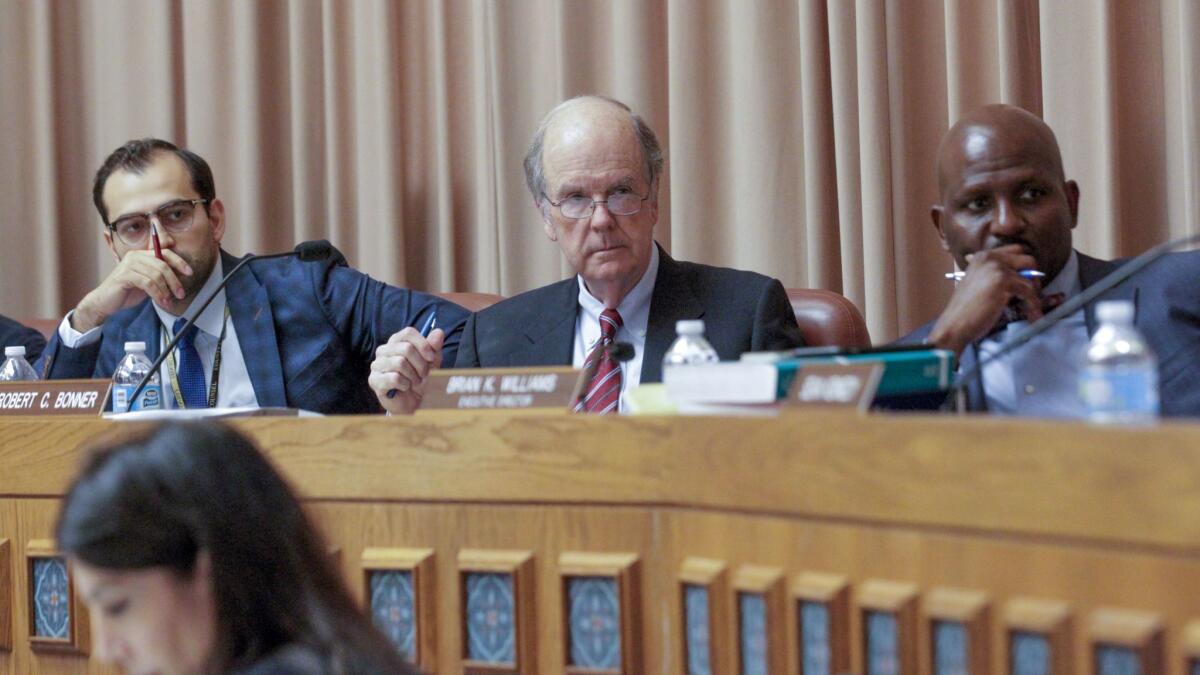L.A. County Sheriff oversight board holds public forum in federal courthouse, where cameras aren’t allowed

- Share via
Sometimes people yell at the monthly turnout of the Los Angeles County Sheriff Civilian Oversight Commission, but on Thursday the fireworks started before some attendees could get inside.
A man attempting to bring a camera to the public forum, held at the 9th Circuit Court of Appeals in Pasadena, was handcuffed and ultimately ejected after he began filming a dispute with security guards over whether he could bring recording devices into the federal courthouse.
For the record:
8:44 a.m. Jan. 23, 2025A previous version of this article said a meeting of the Sheriff Civilian Oversight Commission was held at the 9th District Court of Appeals. It was the 9th Circuit Court of Appeals.
After being detained about an hour, Gary Gileno, a freelance journalist and a member of We The People Rising, a group opposed to illegal immigration, was issued a $280 citation for failing to comply with court security officers’ directions.
Gileno, who said he has filmed a public gathering inside that courthouse before, said he’s well-versed about his rights at open meetings and that what happened to him was “outrageous.”
U.S. Marshals had been telling those entering the building that no electronics were allowed, even if people were headed to the public forum. The agents eventually let most people bring their phones and cameras inside, although they did not allow people to hold up signs in the meeting.
Mike MacBean, acting supervisor for the U.S. Marshals Service for California’s central district, said officers who detained Gileno were simply enforcing rules barring recording devices of any type inside federal courthouses.
But the ordeal highlighted an awkward situation for the oversight commission, which is bound by the state open meetings law that says anyone at official public meetings has a right take pictures, video or audio of the proceedings, unless doing so creates a persistent disturbance.
Commissioners have frequently said they want to foster a welcoming atmosphere for anyone to come and speak about their experiences with the Sheriff’s Department.
“I felt a little humiliated having to take off my shoes and stuff,” said Commissioner Heather Miller, a rabbi, noting the airport-like security measures at the federal courthouse. “You talk about law enforcement triggering things for people.”
Robert C. Bonner, a former federal judge who serves as chair of the civilian oversight panel, said he recommended that the federal courthouse be used for the meeting. The commission has been trying out different locations in search of a more permanent home.
“The cameras are not allowed in a federal courthouse, that’s all I can tell you. These aren’t my rules,” he said.
Bonner said he was not familiar with certain provisions of California’s open meetings law, known as the Ralph M. Brown Act, and that he relies on county counsel for advice on the legalities.
“Why is it that people would have to have their own separate audio recording when we have an audio recording that picks up everything that’s said?” Bonner asked.
The commission posts audio files of its meetings online, but there is typically a lag time of a few weeks.
Brian Williams, the commission’s executive director who approved the location, said he wasn’t aware that cameras were not allowed inside federal courthouses. He said he would keep that in mind when deciding on future sites for the monthly meeting, which has recently been held at the Metropolitan Water District building next to Union Station.
“I want to make sure the public has unfettered access,” Williams said.
Peter Bibring, an attorney with the American Civil Liberties Union of Southern California, said the oversight commission has an obligation to follow state law and should not hold meetings in places where people aren’t allowed to bring cameras or other recording devices.
Also on Thursday, the commission approved a resolution opposing President Trump’s statement last month to a crowd of law enforcement officers in which he told them, “Please don’t be too nice,” when arresting people.
The president was “appearing to encourage and condone out of policy and inappropriate use of force against suspects,” the commission’s resolution said.
Commissioners and members of the public also discussed the Sheriff’s Department’s mental evaluation teams, which pair deputies with mental health clinicians to respond to calls requiring special handling of mentally ill people.
A preliminary report issued by an ad-hoc committee studying the teams said the program should be expanded and given more funding. The report also found that the county Department of Mental Health has faced obstacles assigning enough clinicians to the teams — which currently number 10 — perhaps due to the odd hours the teams must deploy or the perceived risks associated with working alongside deputies. The committee will publish a final report in October.
The preliminary report said that all deputies, who are the first responders on scene regardless of whether a mental evaluation team eventually arrives, should receive training to deescalate volatile situations. While many deputies have been trained in crisis intervention, the department has been unable to set a timeline on when all 2,826 patrol deputies will have completed the training, the report said.
Twitter: @mayalau
More to Read
Sign up for Essential California
The most important California stories and recommendations in your inbox every morning.
You may occasionally receive promotional content from the Los Angeles Times.











